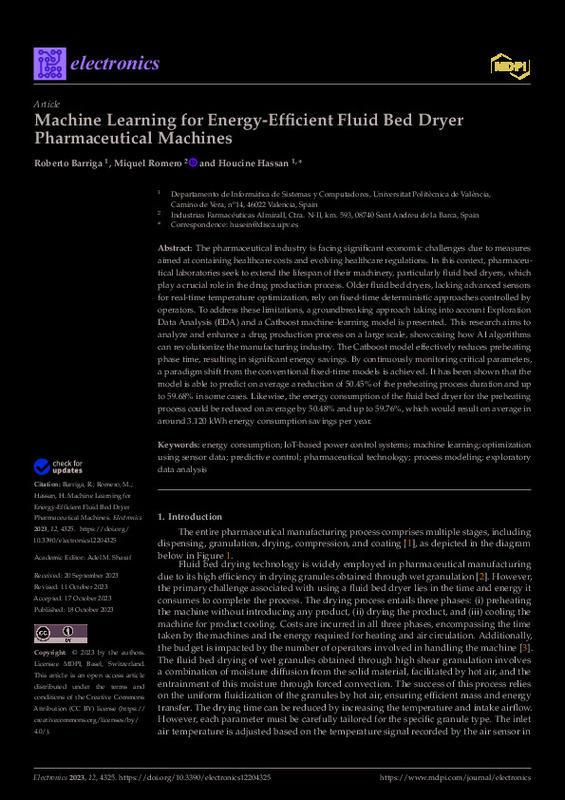JavaScript is disabled for your browser. Some features of this site may not work without it.
Buscar en RiuNet
Listar
Mi cuenta
Estadísticas
Ayuda RiuNet
Admin. UPV
Machine Learning for Energy-Efficient Fluid Bed Dryer Pharmaceutical Machines
Mostrar el registro sencillo del ítem
Ficheros en el ítem
| dc.contributor.author | Barriga, Roberto
|
es_ES |
| dc.contributor.author | Romero, Miquel
|
es_ES |
| dc.contributor.author | Hassan Mohamed, Houcine
|
es_ES |
| dc.date.accessioned | 2024-04-30T18:06:44Z | |
| dc.date.available | 2024-04-30T18:06:44Z | |
| dc.date.issued | 2023-10 | es_ES |
| dc.identifier.uri | http://hdl.handle.net/10251/203877 | |
| dc.description.abstract | [EN] The pharmaceutical industry is facing significant economic challenges due to measures aimed at containing healthcare costs and evolving healthcare regulations. In this context, pharmaceutical laboratories seek to extend the lifespan of their machinery, particularly fluid bed dryers, which play a crucial role in the drug production process. Older fluid bed dryers, lacking advanced sensors for real-time temperature optimization, rely on fixed-time deterministic approaches controlled by operators. To address these limitations, a groundbreaking approach taking into account Exploration Data Analysis (EDA) and a Catboost machine-learning model is presented. This research aims to analyze and enhance a drug production process on a large scale, showcasing how AI algorithms can revolutionize the manufacturing industry. The Catboost model effectively reduces preheating phase time, resulting in significant energy savings. By continuously monitoring critical parameters, a paradigm shift from the conventional fixed-time models is achieved. It has been shown that the model is able to predict on average a reduction of 50.45% of the preheating process duration and up to 59.68% in some cases. Likewise, the energy consumption of the fluid bed dryer for the preheating process could be reduced on average by 50.48% and up to 59.76%, which would result on average in around 3.120 kWh energy consumption savings per year. | es_ES |
| dc.language | Inglés | es_ES |
| dc.publisher | MDPI AG | es_ES |
| dc.relation.ispartof | Electronics | es_ES |
| dc.rights | Reconocimiento (by) | es_ES |
| dc.subject | Energy consumption | es_ES |
| dc.subject | IoT-based power control systems | es_ES |
| dc.subject | Machine learning | es_ES |
| dc.subject | Optimization using sensor data | es_ES |
| dc.subject | Predictive control | es_ES |
| dc.subject | Pharmaceutical technology | es_ES |
| dc.subject | Process modeling | es_ES |
| dc.subject | Exploratory data analysis | es_ES |
| dc.subject.classification | ARQUITECTURA Y TECNOLOGIA DE COMPUTADORES | es_ES |
| dc.title | Machine Learning for Energy-Efficient Fluid Bed Dryer Pharmaceutical Machines | es_ES |
| dc.type | Artículo | es_ES |
| dc.identifier.doi | 10.3390/electronics12204325 | es_ES |
| dc.rights.accessRights | Abierto | es_ES |
| dc.contributor.affiliation | Universitat Politècnica de València. Escuela Técnica Superior de Ingeniería del Diseño - Escola Tècnica Superior d'Enginyeria del Disseny | es_ES |
| dc.description.bibliographicCitation | Barriga, R.; Romero, M.; Hassan Mohamed, H. (2023). Machine Learning for Energy-Efficient Fluid Bed Dryer Pharmaceutical Machines. Electronics. 12(20). https://doi.org/10.3390/electronics12204325 | es_ES |
| dc.description.accrualMethod | S | es_ES |
| dc.relation.publisherversion | https://doi.org/10.3390/electronics12204325 | es_ES |
| dc.type.version | info:eu-repo/semantics/publishedVersion | es_ES |
| dc.description.volume | 12 | es_ES |
| dc.description.issue | 20 | es_ES |
| dc.identifier.eissn | 2079-9292 | es_ES |
| dc.relation.pasarela | S\515777 | es_ES |








